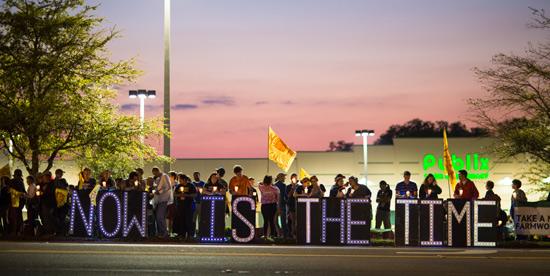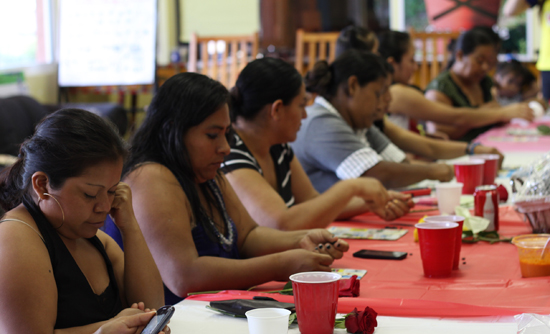
Today, the Coalition of Immokalee Workers launched a new campaign: “Earlier this year, the Fair Food Program won the support of Catapult, a pioneering crowdfunding platform that works with groups around the globe to advance the rights of women and girls. And today, we have the great pleasure of announcing the launch of the Catapult online campaign, “Ensure dignity and respect for farmworkers” — an effort to raise $25,000 in 150 days to help pay for a new auditor for the Fair Food Standards Council (FFSC), the Fair Food Program’s indispensable third-party monitoring body. Now you can help support the FFSC’s crucial, day-to-day human rights work in the fields by checking out the online fundraising campaign here.”
This is a great campaign, a real opportunity to take the struggle for farmworker women’s dignity and respect, and all women workers’ dignity and respect, to a new level.
Across the United States farmworker women struggle and organize to end sexual violence in the fields. Currently over a half million women work in the agricultural sector, the vast majority of whom are undocumented Latinas. Last year, Rape in the Fields highlighted women’s struggles in the fields of California, the orchards of Washington State, and the egg and meat processing plants of Iowa. If you’re in the United States, pretty much whatever is on your table is composed of super-exploitation and extreme violence against women.
Farmworker women are saying, No! They’re saying the abuse is not acceptable and, importantly, it’s not inevitable. When Dolores Huerta says, “Sexual harassment is an epidemic in the fields,” she’s not sighing and giving up. She’s saying an epidemic needs a campaign to eradicate and transform it. When Maricruz Ladino, Olivia Tamayo, Angela Mendoza, Cesilia Lua, Danelia Barajas, Magdalena Alvarez look straight into a reporter’s camera or a jury’s eyes, and describe the weariness as well as intensity, they are spreading the word: Now! Now is the time!
Maricruz Ladino says, “The time came when I said, `No more.’ I made a complaint…. It wasn’t about the money because that does not give you back the integrity you lost as a woman, your self-worth as a woman. I was heard. That’s why I think there was justice. But a part of me died, and no one can give that back to me. This type of thing did not only happen to me. It was happening to many, many more women. And if I stay quiet, then it is going to keep happening. That’s why I want to talk about it now, so that everybody can see themselves in me, so that they won’t stay quiet anymore. They must react, not with violence but with the laws that protect them. Documented or undocumented, you have to speak.”
You have to speak, as women like Esther Abarca, Sandra Garcia, Lupe Gonzalo, Silvia Perez, Nely Rodriguez, and hundreds of others have done and are doing. Across the country, women have organized local farmworker women’s groups, have met with the Equal Employment Opportunity Commission, have filed law suits and more. But now is the time. Now is the time to move from local to national, to create permanent structures that will do more than respond to this abuse and that atrocity and this occasion of mass rape.
Representative Luis Gutierrez, of Illinois, says, “I learned a long time ago that when it comes to these situations, believe the women. Believe the women.” Believe the women. Believe the women who say, NOW IS THE TIME!
(Photo Credit: Forest Woodward / Facebook)


